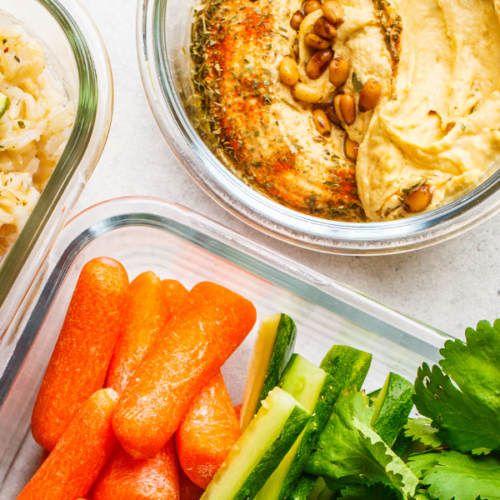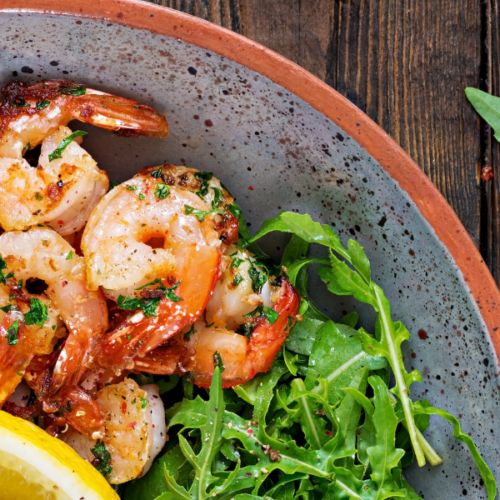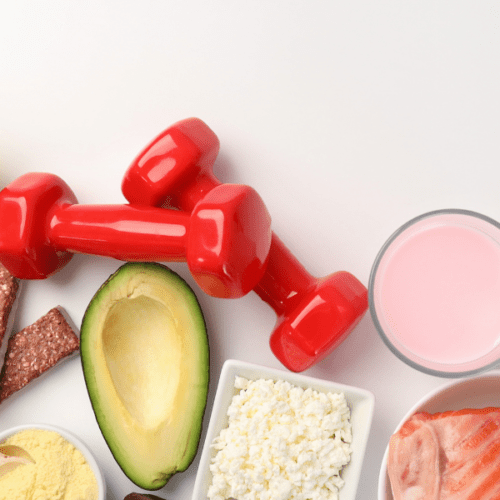Table of Contents
For many people, getting fit means losing weight and building muscle – and that means hitting the gym (or a home workout). And while exercise is key to hitting fitness goals, it’s important not to forget about what you’re putting into your body. The expression “you are what you eat” rings very true when it comes to getting lean and building muscle. And while many of us know what we shouldn’t eat, did you know that many foods can help you meet your fitness goals better than just exercise alone? Let’s explore the best foods for weight loss, muscle gain, and hitting your goals!
Why Food Matters
Have you ever heard the saying “abs are made in the kitchen”? Or maybe, “you can’t outrun a bad diet.” The gist of sayings like these is that diet plays a critical role in our overall fitness level, even if we exercise seven days a week. For example, if you abide by the idea that you can burn off a daily cheeseburger and milkshake with a three-mile run, you’re doing your body a serious disservice. Not only would you have to run a lot to make that equation work, but you’d also be forgetting about the benefits of a healthy diet, such as having the right fuel for your workouts or keeping your cholesterol healthy. When we take a holistic and long-term view of our health, there’s just no getting around the need for a healthy diet. And that includes when you’re trying to lose weight and put on muscle! Read the article “What’s More Important to Your Fitness Goals, Diet or Exercise?” for more information on how they work together.
What are the Best Foods for Weight Loss and Muscle Gain?
Now, we’re not saying to never eat that cheeseburger and milkshake, but overall, choosing healthy food consistently can help you feel better while also hitting your body weight and muscle gain goals. So, what should you eat to help your body become a lean, mean, fat-burning machine? Let’s find out!
Lean Proteins.
Proteins are the building blocks of muscle, making them a crucial component of any fitness-oriented diet, especially if you’re looking to develop your muscle tone. Choosing lean protein sources is important to ensure that you’re fueling muscle growth without putting on excess fat. Chicken breast, turkey, fish, eggs, tofu, and legumes are excellent choices for lean protein sources, and they also provide essential amino acids that aid in muscle repair and recovery (which you’ll need after hitting the weights).
Healthy Fats.
Many macronutrients have become vilified in our modern restriction-diet world, especially fats. But our bodies need fat to function properly – from protecting our organs to supporting cell growth to absorbing vital nutrients. So, the key is choosing healthy – or unsaturated – fats. Consuming good fats from sources such as vegetable oils (olive, canola, sunflower, soy, and corn), nuts, seeds, and fish is a great way to support muscle growth and aid in weight loss by promoting satiety. Unhealthy or saturated fats from sources such as red meat, butter, cheese, and ice cream are best avoided or eaten in moderation.
Complex Carbohydrates.
Like fats, carbs have also gotten a bad rap, with many popular fad diets advocating low to zero-carb intake. But carbs are an important macronutrient that our bodies need, so while eliminating them may offer short-term weight loss, it’s not a sustainable or healthy choice. So, what should you look for when choosing carbs? The key is picking complex carbs that provide a steady release of energy, unlike a simple carb-like sugar that spikes your blood sugar and leaves you feeling tired and cranky. Quinoa, sweet potatoes, brown rice, oats, and whole-grain bread are excellent sources of complex carbs. They sustain energy levels, support workouts, and help prevent muscle fatigue.
Fruits and Veggies.
No list of healthy foods would be complete without fruits and vegetables. A diet rich in colorful vegetables and fruits provides essential vitamins, minerals, and antioxidants and can support overall health and aid in weight loss by promoting a feeling of fullness. Additionally, fruits and vegetables contribute to optimal digestion and nutrient absorption. You really can’t go wrong when picking veggies and fruits. However, you may want to gravitate toward leafy greens like kale and spinach, colorful veggies like bell peppers, and fruits like oranges, pomegranates, and berries packed with healthy nutrients.
Water, water, and more water.
While it’s easy to focus on the best foods for weight loos, we’d be remiss if we didn’t talk about the importance of staying hydrated when it comes to weight loss and building muscle. Water is essential for various physiological processes, including nutrient transportation, digestion, and temperature regulation. Staying hydrated also helps control appetite and can enhance exercise performance. And you don’t have to drink just plain old water – try adding berries or citrus fruits for added flavor and variety.
Fuel Your Body Right
Achieving optimal weight loss and muscle gain is a multifaceted process that involves both exercise and nutrition. By incorporating lean proteins, complex carbohydrates, healthy fats, and a variety of fruits and vegetables into your diet, you provide your body with the necessary fuel to reach your fitness goals. With the right nutrition, you’ll see improvements in your physique and experience enhanced energy levels and overall well-being.
If you have questions on how to make healthier food choices in your life, reach out to Forge for a free consultation. Our team of certified nutrition experts is ready to create a meal plan tailored to your needs and goals!

Making Healthy Eating a Lifestyle: Embracing the Joy of Food
If you’re on a wellness journey, it can be overwhelming to do it alone. Distractions, lost motivation, and conflicting advice can make it tempting to hang up the gym shoes for good. But the benefits of working with a personal trainer can be a guiding light, providing structure, support, and accountability to keep their clients on track toward their goals.

What Are the Best Foods for Weight Loss and Muscle Gain?
Table of Contents For many people, getting fit means losing weight and building muscle – and that means hitting the gym (or a home workout).

Why You Should Hire a Personal Trainer and Nutritionist
Table of Contents Whether you’re a fitness newbie or a seasoned pro, finding the right food to eat, which type of workout to do, and





